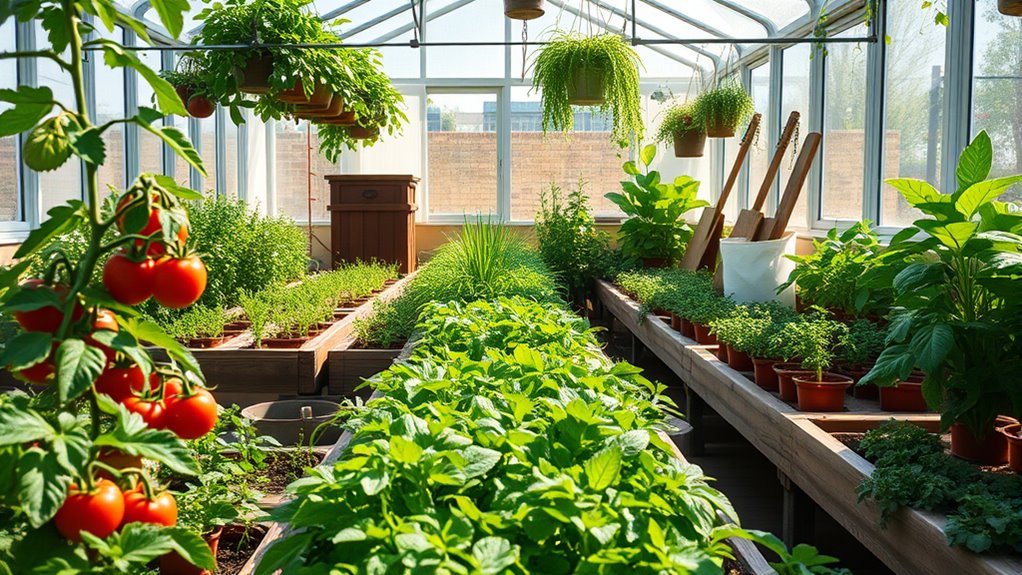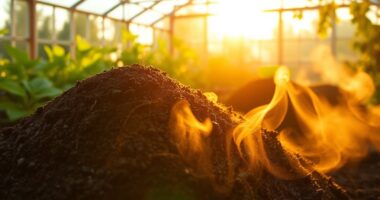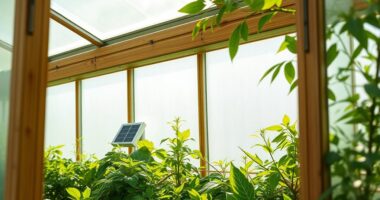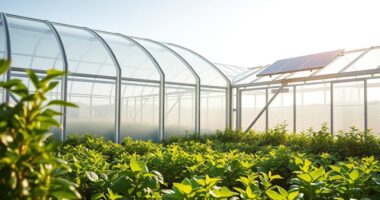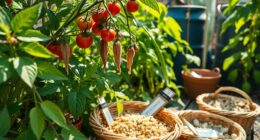To go organic and chemical-free in your greenhouse, focus on natural pest management and soil enrichment. Use compost made from kitchen scraps and garden waste to feed your plants naturally, and practice crop rotation and companion planting to prevent pests. Introduce beneficial insects like ladybugs, and apply organic repellents such as neem oil. By combining these eco-friendly methods, you’ll create a healthy, sustainable environment that yields vibrant, chemical-free crops—there’s more to discover to optimize your greenhouse success.
Key Takeaways
- Implement composting techniques to create nutrient-rich, organic soil that supports healthy plant growth without chemicals.
- Utilize biological pest control methods such as beneficial insects and microbial insecticides to manage pests naturally.
- Practice crop rotation and companion planting to prevent pest outbreaks and promote plant health organically.
- Use organic deterrents like neem oil and insecticidal soaps to protect plants while avoiding synthetic chemicals.
- Maintain a healthy greenhouse ecosystem through proper sanitation, mulching, and soil management for sustainable, chemical-free gardening.

Greenhouse gardening offers a controlled environment that extends growing seasons and boosts plant productivity. To keep your greenhouse truly organic, you need effective composting techniques that nourish your soil naturally. Composting transforms kitchen scraps, garden waste, and plant debris into rich, nutrient-dense compost. By regularly adding organic matter and turning your compost pile, you *guarantee* a steady supply of healthy soil amendments. This not only enhances plant growth but also reduces the need for chemical fertilizers. When you use compost as your primary fertilizer, you create a sustainable cycle that encourages healthy roots and vigorous plants. Plus, compost improves soil structure, moisture retention, and aeration, all *essential* for thriving greenhouse crops. Incorporating nutrient retention into your composting practices helps ensure your plants receive consistent nourishment over time.
Effective composting enriches soil naturally, boosting plant health and reducing reliance on chemical fertilizers.
Alongside composting, pest management plays a *crucial* role in organic greenhouse gardening. Instead of relying on chemical pesticides, you harness natural pest control methods. Start by practicing good sanitation—remove weeds, dead leaves, and fallen fruit, which can harbor pests. Introduce beneficial insects like ladybugs and predatory beetles that prey on common pests such as aphids and spider mites. Using organic deterrents like neem oil or insecticidal soaps can also keep pests in check without harming your plants or the environment. Additionally, crop rotation and companion planting are effective strategies to prevent pest outbreaks. For example, planting basil near tomatoes can repel certain insects, while rotating crops disrupts pest life cycles.
You’ll find that pest management in a greenhouse requires vigilance and a proactive approach. Regularly inspect your plants for early signs of trouble, catching issues before they escalate. Biological controls, such as introducing parasitic wasps or using microbial insecticides, are excellent organic options that target specific pests without affecting beneficial insects or the overall ecosystem. Mulching around plants helps deter soil-borne pests and maintains moisture levels. By combining these techniques, you create a balanced, pest-resistant environment that minimizes chemical interventions.
Maintaining an organic greenhouse isn’t just about avoiding chemicals; it’s about fostering a healthy, resilient ecosystem. Proper composting techniques ensure your plants receive the nutrients they need, while strategic pest management keeps pests at bay naturally. These methods work hand-in-hand to produce high-yield, flavorful crops without the risks associated with synthetic chemicals. As you develop your organic gardening skills, you’ll notice healthier plants, improved soil vitality, and a more sustainable approach to growing in your greenhouse. With patience and consistency, your greenhouse can become a thriving, chemical-free sanctuary for a wide variety of fresh, organic produce.
Frequently Asked Questions
How Can I Naturally Control Pests Without Chemicals?
To naturally control pests, you can attract beneficial insects like ladybugs and predatory beetles that prey on pests. Also, try companion planting, which involves growing certain plants together to repel harmful bugs and attract helpful ones. These methods create a balanced ecosystem in your greenhouse, reducing pest problems without chemicals. By encouraging beneficial insects and using strategic planting, you maintain a healthy, chemical-free environment for your plants to thrive.
What Organic Fertilizers Are Best for Greenhouse Plants?
For fabulous foliage, focus on fantastic fertilizers like compost tea and fish emulsion. Compost tea boosts beneficial bacteria, aiding plant health, while fish emulsion supplies a swift, sustainable surge of nutrients. You’ll find these organic options foster flourishing growth, foster soil resilience, and fight off deficiencies. With consistent application, you’ll cultivate a thriving greenhouse, all while keeping things clean, chemical-free, and completely eco-friendly.
How Do I Maintain Soil Health Organically?
To sustain soil health organically, you should focus on composting techniques that add rich nutrients back into your soil. Regular soil testing methods help you monitor pH levels and nutrient content, guiding your fertilization efforts. Keep your soil covered with mulch to retain moisture and prevent erosion. Rotate crops to reduce pests and nutrient depletion. These practices ensure a healthy, vibrant environment for your greenhouse plants without chemicals.
Are There Organic Alternatives to Synthetic Growth Stimulants?
Imagine your plants thriving with natural boosts—there’s no need for synthetic growth stimulants. You can use organic alternatives like compost teas and seaweed extracts to stimulate growth, improve root development, and boost resilience. These natural solutions are easy to prepare and eco-friendly. By incorporating them into your routine, you support healthy plant development while avoiding chemicals, creating a sustainable and vibrant greenhouse environment.
How Can I Reduce Water Usage Organically?
To reduce water usage organically, start by collecting rainwater through harvesting systems to maximize natural supply. Use mulching techniques around your plants to retain soil moisture and minimize evaporation. You can also improve soil health with organic compost, which helps retain water efficiently. These methods help conserve water sustainably, ensuring your plants stay healthy while reducing dependence on external water sources.
Conclusion
By adopting organic, chemical-free greenhouse gardening methods, you create a healthier environment for your plants and yourself. For example, imagine a gardener who switched to composting and natural pest control, resulting in vibrant, pest-resistant tomatoes without chemicals. This approach not only boosts plant health but also supports eco-friendly practices. Embrace these methods, and you’ll enjoy a thriving, sustainable garden that nourishes both your family and the planet.
